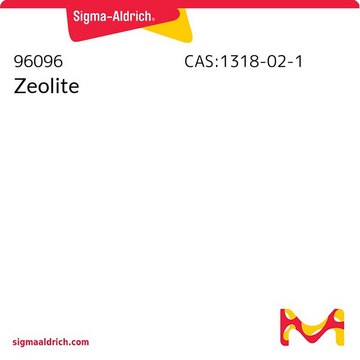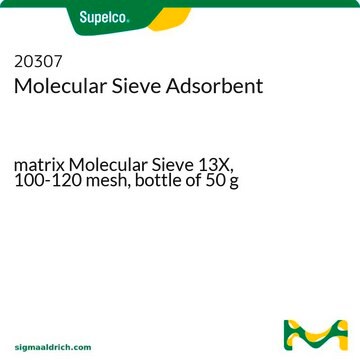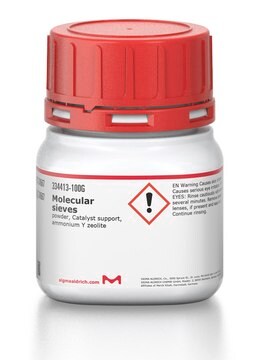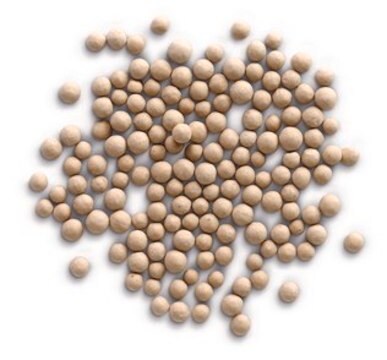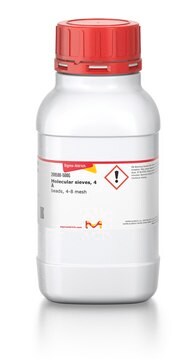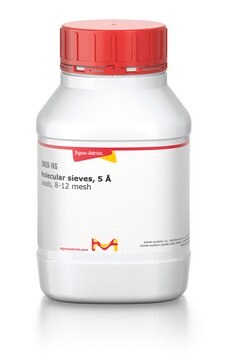334359
Molekularsiebe, 13X
pellets, 3.2 mm
Anmeldenzur Ansicht organisationsspezifischer und vertraglich vereinbarter Preise
Alle Fotos(1)
About This Item
Lineare Formel:
Na86[AlO2)86(SiO2)106] · xH2O
CAS-Nummer:
MDL-Nummer:
UNSPSC-Code:
23201100
eCl@ss:
32110204
Empfohlene Produkte
Suchen Sie nach ähnlichen Produkten? Aufrufen Leitfaden zum Produktvergleich
Allgemeine Beschreibung
Choosing a Molecular Sieve:
1. The preferential adsorption of one molecule over another depends upon pore diameter and mesh size.
2. The dynamic capacity of the silica gel for adsorbing a particular compound is governed by the internal surface area; the greater the surface area, the greater the dynamic capacity.
3. Rate of adsorption and sharpness of resolution are dependent chiefly on particle size and column packing; a fine particle size gives optimum sharpness of resolution.
4. Liquids are most readily adsorbed from solvents in which they are least soluble; a good solvent makes a good desorbing agent.
5. Highly polar liquids are readily adsorbed. Compounds having hydroxyl groups, or containing oxygen are strongly adsorbed.
6. For similar compounds, the higher the molecular weight the higher the selectivity.
7. For hydrocarbons of similar molecular weight, adsorptivity increases with the number of double bonds.
1. The preferential adsorption of one molecule over another depends upon pore diameter and mesh size.
2. The dynamic capacity of the silica gel for adsorbing a particular compound is governed by the internal surface area; the greater the surface area, the greater the dynamic capacity.
3. Rate of adsorption and sharpness of resolution are dependent chiefly on particle size and column packing; a fine particle size gives optimum sharpness of resolution.
4. Liquids are most readily adsorbed from solvents in which they are least soluble; a good solvent makes a good desorbing agent.
5. Highly polar liquids are readily adsorbed. Compounds having hydroxyl groups, or containing oxygen are strongly adsorbed.
6. For similar compounds, the higher the molecular weight the higher the selectivity.
7. For hydrocarbons of similar molecular weight, adsorptivity increases with the number of double bonds.
Regeneration or Activation:
A saturated molecular sieve can be restored to its original capacity by regeneration, the principle of which involves changing the conditions surrounding the adsorbent to correspond to a very low equilibrium capacity. In general, the greater the difference between the equilibrium capacities of adsorption and regeneration, the more rapid and complete the regeneration.
The sieve may be regenerated in one of four ways:
1. Thermal reactivation –The maximum regeneration temperature for Silica is 300°C.
2. Pressure reactivation
3. Passing an appropriate fluid through the gel bed at normal temperature and pressure.
4. Displacement of adsorbates by passing a high concentration of molecules in a fluid through the bed.
A saturated molecular sieve can be restored to its original capacity by regeneration, the principle of which involves changing the conditions surrounding the adsorbent to correspond to a very low equilibrium capacity. In general, the greater the difference between the equilibrium capacities of adsorption and regeneration, the more rapid and complete the regeneration.
The sieve may be regenerated in one of four ways:
1. Thermal reactivation –The maximum regeneration temperature for Silica is 300°C.
2. Pressure reactivation
3. Passing an appropriate fluid through the gel bed at normal temperature and pressure.
4. Displacement of adsorbates by passing a high concentration of molecules in a fluid through the bed.
Signalwort
Warning
H-Sätze
Gefahreneinstufungen
Eye Irrit. 2 - Skin Irrit. 2 - STOT SE 3
Zielorgane
Respiratory system
Lagerklassenschlüssel
11 - Combustible Solids
WGK
WGK 3
Flammpunkt (°F)
Not applicable
Flammpunkt (°C)
Not applicable
Analysenzertifikate (COA)
Suchen Sie nach Analysenzertifikate (COA), indem Sie die Lot-/Chargennummer des Produkts eingeben. Lot- und Chargennummern sind auf dem Produktetikett hinter den Wörtern ‘Lot’ oder ‘Batch’ (Lot oder Charge) zu finden.
Besitzen Sie dieses Produkt bereits?
In der Dokumentenbibliothek finden Sie die Dokumentation zu den Produkten, die Sie kürzlich erworben haben.
Kunden haben sich ebenfalls angesehen
Equilibrium adsorption of ethane, ethylene, isobutane, carbon dioxide, and their binary mixtures on 13X molecular sieves.
Hyun SH and Danner RP.
Journal of Chemical and Engineering Data, 27(2), 196-200 (1982)
Adsorption of CO2 on molecular sieves and activated carbon.
Siriwardane RV, et al.
Energy and Fuels, 15(2), 279-284 (2001)
Unser Team von Wissenschaftlern verfügt über Erfahrung in allen Forschungsbereichen einschließlich Life Science, Materialwissenschaften, chemischer Synthese, Chromatographie, Analytik und vielen mehr..
Setzen Sie sich mit dem technischen Dienst in Verbindung.